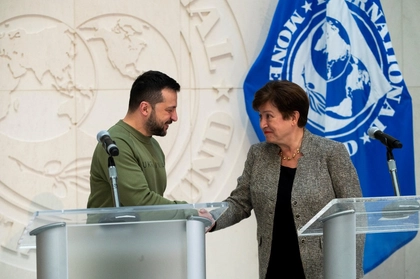The European Parliament voted for an extraordinary loan of up to €35 billion ($37.84 billion) to Ukraine, backed by revenues generated from $280 billion worth of frozen Russian assets.
“With 518 votes in favor, 56 against and 61 abstentions, Parliament endorsed the new macro-financial assistance (MFA) to help Ukraine against Russia’s brutal war of aggression,” the EU Parliament press release stated.
JOIN US ON TELEGRAM
Follow our coverage of the war on the @Kyivpost_official.
The new funding will be disbursed until the end of 2025.
Previously Kyiv Post reported that Ukraine may also receive funds arising from Russia’s frozen assets in the form of a loan, but “the burden of a loan will not fall on Ukraine,” Wally Adeyemo, the US Deputy Secretary of the Treasury, said during a briefing to reporters on May 29 in Kyiv.
Kyiv Post source in the Ministry of Finance said that negotiations were taking place to make the loan unconditional, as a compensation for Russia’s unprovoked aggression in February 2022.
The EU parliament tied the new macro-financial assistance to “Ukraine’s continued commitment to uphold effective democratic mechanisms, respect human rights, and further policy conditions to be set out in a memorandum of understanding.” “Additionally, the management and control systems outlined in the Ukraine Plan, along with specific measures to prevent fraud and other irregularities, will apply to the MFA loan,” the EU parliament stated.

Other Topics of Interest
IMF Lends Ukraine Another $1.1 billion After the EFF Program Fifth Review
Ukraine has never reached so far in the IMF Program Reviews, but the цar-torn country needs successful results now more than ever.
The loan will be disbursed within the framework of The Ukraine Loan Cooperation Mechanism and make future revenues from the frozen Russian Central Bank assets located in the EU available to Ukraine.
Despite the positive vote the size of the loan may not be final
The €35 billion funding will provide much needed help for the war-torn country to finance its budget during 2025. But the risk remains that it may not be enough.
“The final amount that the EU will contribute could be lower, depending on the size of the loans provided by other G7 partners,” the EU press release said.
In September, the European Commission announced a €35 billion ($37.84 billion) EU loan for Ukraine as part of a plan by G7 partners to issue loans of up to $50 billion (about €45 billion) to be provided by the EU and G7 partners.
The financial transaction will consist of several contributions, with the largest chunk of €35 billion ($37.84 billion) provided from the EU, but also from the US, the UK, Canada and Japan.
“If other partners, particularly the US, provide more than $15 billion in aid, the EU’s contribution will decrease. $20 billion is expected from the US, and the UK, Canada, and Japan have also already announced loans, the EU will actually contribute less,” Oleksandra Betliy, an analyst at The Institute for Economic Research and Policy Consulting (IER) wrote on Facebook commenting the EU’s decision design.
It is also unknown whether this cash could be allocated to for use in Ukraine’s military defense against Russia’s invasion of the country. “Not all of our international partners understand that this $50 billion is not just about budget support for non-defense, but also for security-related purposes,” Betliy wrote.
The loan will be financed from the profits received from frozen Russian Central Bank assets of $280 billion. $191 billion of Russia’s central bank assets are held by Euroclear, a clearing house situated in Brussels. In February it reported €4.4 billion ($4.75 billion) in interest had been generated by the funds which could provide Belgium with €1.085 billion ($1.17 billion) in taxes, according to The Guardian.
Meanwhile, the EU parliament reported €210 billion ($227.01 billion) in assets from the Central Bank of Russia are held in the union and they “remain frozen under sanctions imposed over Moscow’s invasion of Ukraine in February 2022.”




